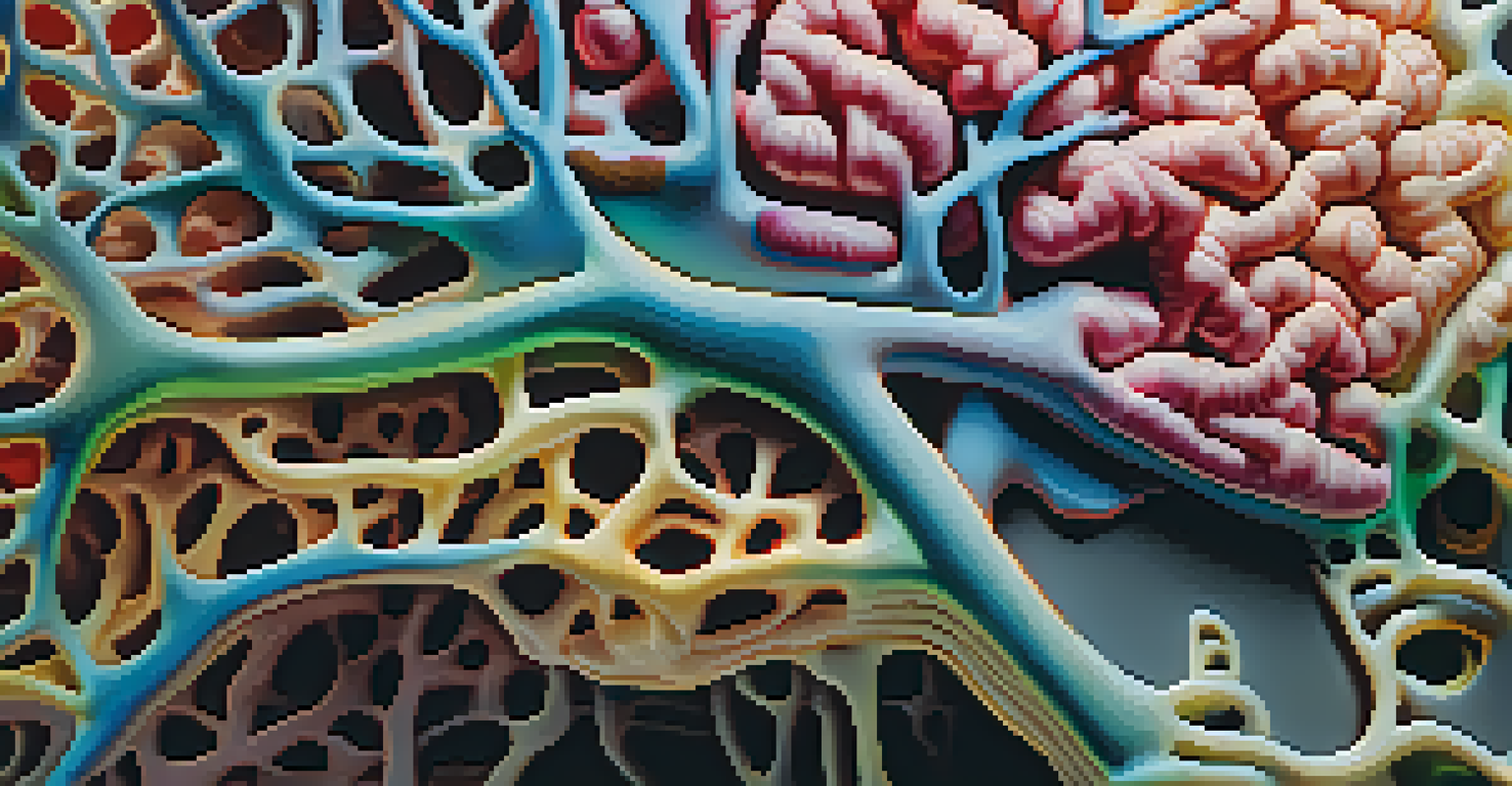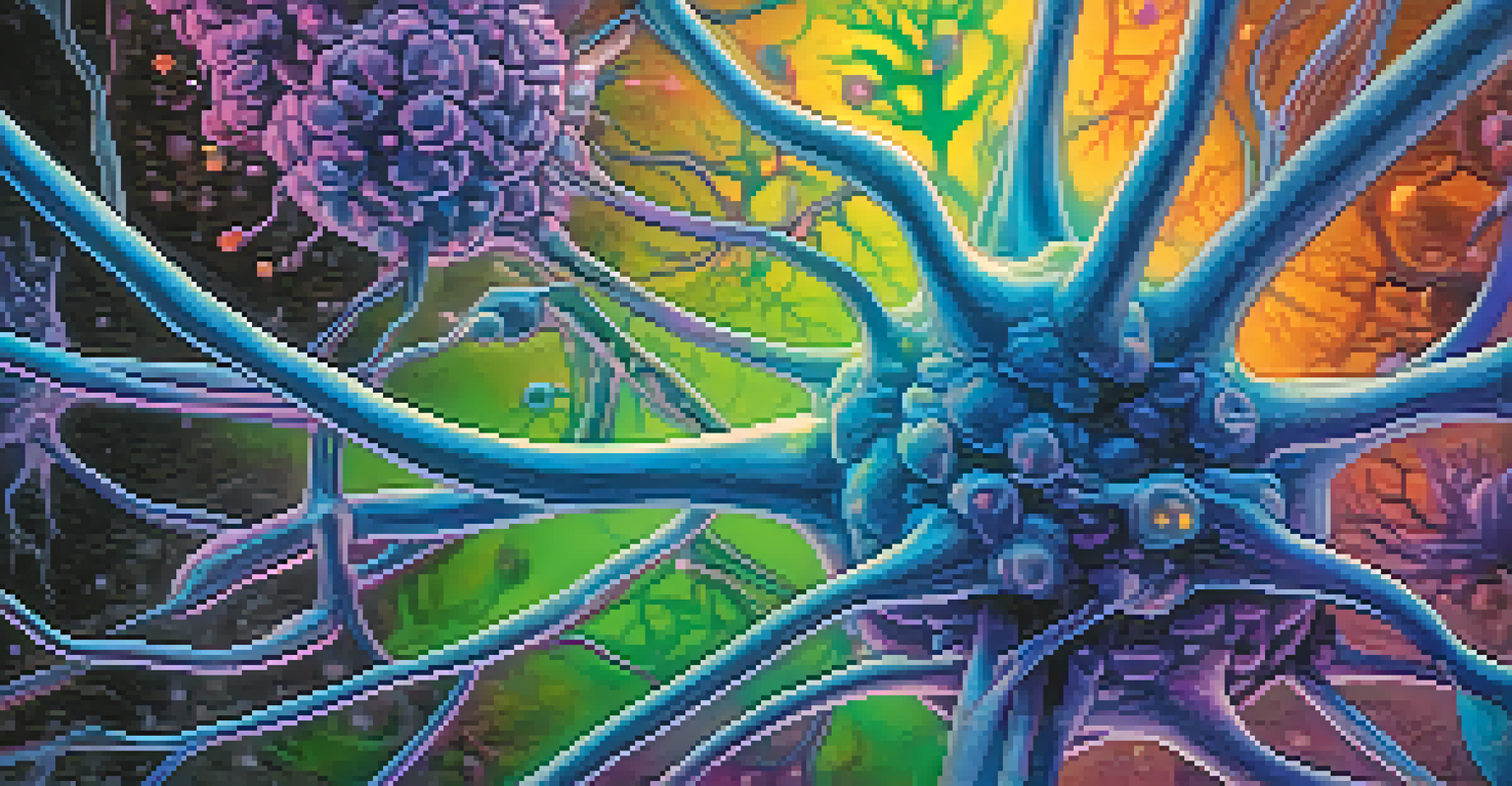The Connection Between Cannabinoids and Neuroprotection

What Are Cannabinoids and Their Role in the Body?
Cannabinoids are compounds found in the cannabis plant that interact with our body's endocannabinoid system (ECS). This system plays a crucial role in maintaining homeostasis, or balance, in various physiological processes such as mood, memory, and immune response. Notably, cannabinoids like THC and CBD bind to cannabinoid receptors in the brain and throughout the body, influencing neural activity and potentially offering various health benefits.
The brain is a world consisting of a number of worlds within itself.
The ECS is made up of receptors, endocannabinoids (naturally occurring compounds), and enzymes that help regulate many bodily functions. When cannabinoids enter the body, they can either enhance or inhibit the effects of these endocannabinoids. This interaction can lead to various outcomes, from pain relief to neuroprotection, making cannabinoids a fascinating area of research.
Understanding cannabinoids and their role in the ECS is the first step toward exploring their potential neuroprotective effects. As scientists continue to study these compounds, we are beginning to uncover their promising implications for brain health and overall well-being.
The Brain's Vulnerability and Need for Protection
The brain is an incredibly complex organ, and it is vulnerable to a range of conditions that can affect its health. Factors such as oxidative stress, inflammation, and neurodegeneration can lead to serious disorders like Alzheimer's and Parkinson's disease. Understanding these vulnerability factors is essential for developing effective treatments and preventive measures.

Oxidative stress occurs when there is an imbalance between free radicals and antioxidants in the body, leading to cellular damage. This process can accelerate aging and contribute to neurodegenerative diseases. Inflammation, while a natural response to injury or infection, can also become chronic and harm brain cells if it persists over time.
Cannabinoids Support Brain Health
Cannabinoids interact with the endocannabinoid system to promote homeostasis, potentially offering neuroprotective benefits.
Given these vulnerabilities, finding ways to protect the brain is crucial. This is where the neuroprotective properties of cannabinoids come into play, as they may help mitigate some of the damage caused by these harmful processes.
How Cannabinoids May Offer Neuroprotection
Research suggests that cannabinoids may have neuroprotective properties that help shield brain cells from damage. For instance, studies have shown that CBD can reduce inflammation and oxidative stress, two significant contributors to neurodegeneration. By addressing these issues, cannabinoids may help preserve cognitive function and overall brain health.
Cannabinoids are a fascinating line of research with potential to impact the future of medicine.
Moreover, cannabinoids like THC can promote neurogenesis, the process of generating new neurons, particularly in the hippocampus, an area of the brain associated with memory and learning. This ability to encourage the growth of new brain cells could be crucial for recovery following brain injuries or in combating age-related cognitive decline.
As scientists delve deeper into the mechanisms behind cannabinoids' neuroprotective effects, they are uncovering exciting possibilities for therapeutic applications. This research may lead to new treatments for various neurological disorders, providing hope for those affected.
The Role of Inflammation in Neurodegeneration
Inflammation is a double-edged sword in the body; it can protect us from harm but also contribute to disease when it becomes chronic. In the brain, prolonged inflammation can disrupt neural connections and accelerate neurodegeneration. This makes understanding the relationship between inflammation and neuroprotection vital for developing effective treatments.
Cannabinoids have shown promise in modulating the inflammatory response within the brain. By interacting with the ECS, cannabinoids can help reduce the release of pro-inflammatory cytokines, which are signaling molecules that promote inflammation. This reduction can lead to a healthier environment for neurons, potentially slowing down the progression of neurodegenerative diseases.
Inflammation Accelerates Neurodegeneration
Chronic inflammation in the brain can disrupt neural connections, making it crucial to understand its relationship with neuroprotection.
As research continues to explore the intricate relationship between cannabinoids and inflammation, we may find that these compounds offer a new approach to managing neurodegenerative conditions. This could pave the way for innovative therapies that focus on inflammation as a target for neuroprotection.
Neurogenesis: The Brain's Regenerative Capacity
Neurogenesis, the process of forming new neurons, is a remarkable ability of the brain that plays a crucial role in learning and memory. Factors such as stress, diet, and exercise can influence neurogenesis, but recent studies suggest that cannabinoids may also have a significant impact. This raises intriguing questions about how we can harness these compounds for cognitive health.
Research has indicated that compounds like CBD can promote neurogenesis in animal models, particularly in the hippocampus. This is exciting because it suggests that cannabinoids could help rejuvenate the brain and enhance cognitive function, especially in aging individuals or those recovering from brain injuries.
If cannabinoids can indeed foster neurogenesis, they may hold the key to developing new therapies aimed at improving brain health. This line of inquiry is a promising frontier in neuroscience, offering hope for conditions that currently have limited treatment options.
Current Research and Future Directions
The research surrounding cannabinoids and neuroprotection is still in its infancy, but it has already yielded promising results. Scientists are conducting clinical trials to evaluate the efficacy of cannabinoids in treating various neurological disorders, including multiple sclerosis, epilepsy, and neurodegenerative diseases. These studies are crucial for validating the therapeutic potential of cannabinoids.
As the body of evidence grows, it is becoming clear that cannabinoids could play a significant role in neuroprotection. However, more rigorous research is needed to understand the underlying mechanisms and determine optimal dosages for therapeutic use. This will ensure that patients receive safe and effective treatments tailored to their specific needs.
Neurogenesis Enhances Cognitive Function
Cannabinoids like CBD may promote neurogenesis, particularly in the hippocampus, which is essential for learning and memory.
Looking ahead, the future of cannabinoid research is bright. As we continue to uncover the complexities of cannabinoids and their impact on brain health, we may find innovative ways to harness their potential for neuroprotection and improve the quality of life for those affected by neurological conditions.
Conclusion: The Promise of Cannabinoids for Brain Health
In conclusion, cannabinoids represent a fascinating area of research with significant potential for neuroprotection. Their ability to modulate inflammation, promote neurogenesis, and counteract oxidative stress presents exciting opportunities for enhancing brain health. As scientists continue to explore these compounds, we may be on the brink of discovering new treatments that could revolutionize how we approach neurological disorders.
While the current research is promising, it's essential to remain cautious. Understanding the complexities of cannabinoids and their effects on the brain will take time, and ongoing studies will help clarify their therapeutic applications. However, the potential benefits for brain health are too significant to ignore.

As we look to the future, cannabinoids could become integral to strategies aimed at preserving cognitive function and treating neurological diseases. This journey of discovery not only holds promise for patients but also reflects the evolving understanding of how nature can help us protect our most vital organ.